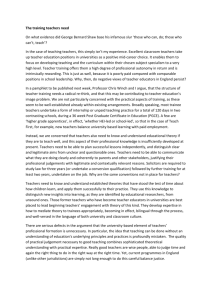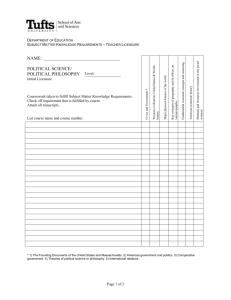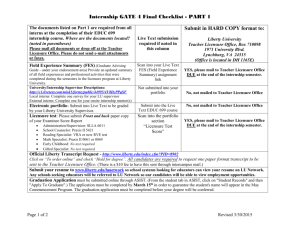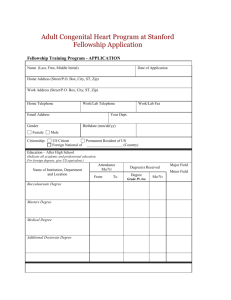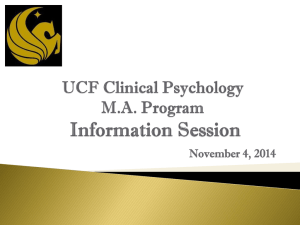FAQ: Reading Specialists 1 FAQs: Advising for Reading Specialists
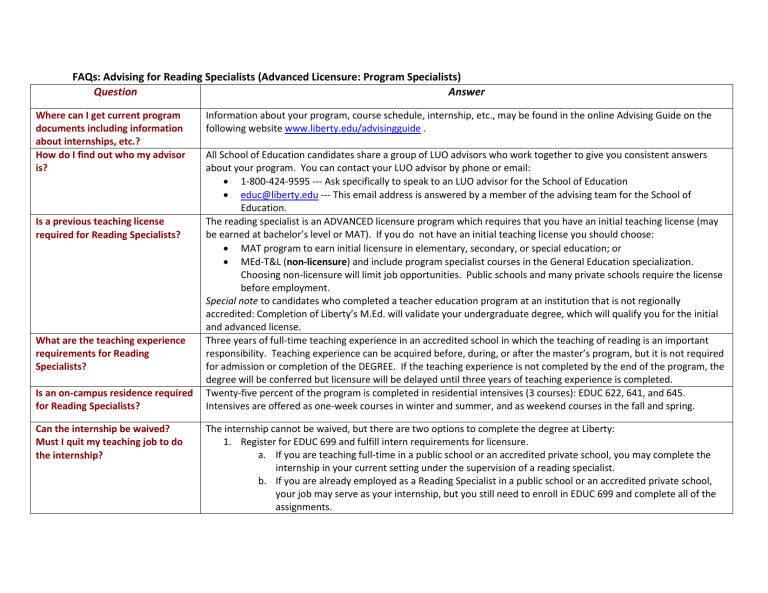
FAQs: Advising for Reading Specialists (Advanced Licensure: Program Specialists)
Question Answer
Where can I get current program documents including information about internships, etc.?
How do I find out who my advisor is?
Is a previous teaching license required for Reading Specialists?
What are the teaching experience requirements for Reading
Specialists?
Is an on-campus residence required for Reading Specialists?
Information about your program, course schedule, internship, etc., may be found in the online Advising Guide on the following website www.liberty.edu/advisingguide .
All School of Education candidates share a group of LUO advisors who work together to give you consistent answers about your program. You can contact your LUO advisor by phone or email:
1-800-424-9595 --- Ask specifically to speak to an LUO advisor for the School of Education
educ@liberty.edu
--- This email address is answered by a member of the advising team for the School of
Education.
The reading specialist is an ADVANCED licensure program which requires that you have an initial teaching license (may be earned at bachelor’s level or MAT). If you do not have an initial teaching license you should choose:
MAT program to earn initial licensure in elementary, secondary, or special education; or
MEd-T&L (non-licensure) and include program specialist courses in the General Education specialization.
Choosing non-licensure will limit job opportunities. Public schools and many private schools require the license before employment.
Special note to candidates who completed a teacher education program at an institution that is not regionally accredited: Completion of Liberty’s M.Ed. will validate your undergraduate degree, which will qualify you for the initial and advanced license.
Three years of full-time teaching experience in an accredited school in which the teaching of reading is an important responsibility. Teaching experience can be acquired before, during, or after the master’s program, but it is not required for admission or completion of the DEGREE. If the teaching experience is not completed by the end of the program, the degree will be conferred but licensure will be delayed until three years of teaching experience is completed.
Twenty-five percent of the program is completed in residential intensives (3 courses): EDUC 622, 641, and 645.
Intensives are offered as one-week courses in winter and summer, and as weekend courses in the fall and spring.
Can the internship be waived?
Must I quit my teaching job to do the internship?
The internship cannot be waived, but there are two options to complete the degree at Liberty:
1.
Register for EDUC 699 and fulfill intern requirements for licensure. a.
If you are teaching full-time in a public school or an accredited private school, you may complete the internship in your current setting under the supervision of a reading specialist. b.
If you are already employed as a Reading Specialist in a public school or an accredited private school, your job may serve as your internship, but you still need to enroll in EDUC 699 and complete all of the assignments.
FAQ: Reading Specialists 2
How long must the Reading
Specialists internship be? c.
If your employment is not in an accredited school, you should make arrangements to complete the internship in an accredited school, perhaps through release time and/or summer school.
2.
If you cannot arrange release time and/or summer school for the internship, register for EDUC 698 and complete the degree without licensure (“opt out”). We can verify that you completed the coursework but did not complete the internship under LU supervision. It is possible to earn licensure at a later date by completing the internship requirement (within a 5 year limit).
Note: All M.Ed. in Reading Specialist degree requirements must be completed, including three intensives on campus.
Otherwise the candidate must change to the M.Ed. in Teaching & Learning (non-licensure) and include program specialist courses in the General Education specialization.
Minimum of the following documented field experience hours required for Reading Specialists:
200 hours of reading specialist duties
“Early field experiences” are experiential learning opportunities throughout the program to give candidates short practical experiences as Reading Specialists. These might have been accumulated as the candidate completed course benchmark assignments in collaboration with schools before the formal internship and are to be deducted from the
200-hour total. Whatever the balance is must be completed during the formal internship.
The internship is more structured than the early field experiences, requiring specified projects and a competency-based portfolio. A total of 200 cumulative field experience hours are required. The formal internship is concentrated into one semester (16 weeks).
See the following link for additional information: Student teaching/Internship
To access the Field Experience form that you’ll need to complete throughout your program, click on Program
Specialists in the online Advising Guide.
Who will supervise my internship? Internship Supervisors must be licensed and experienced Reading Specialists with a graduate degree. You will work with two supervisors in your internship. Your Onsite Supervisor will assist you in your school setting. Your Online Supervisor will grade internship assignments that you submit through Blackboard and LiveText.
I already have a master’s degree and don’t want another one. Can I just take the courses I lack for licensure as a reading specialist?
FOR LIBERTY GRADUATES: If you have already earned a degree from Liberty, you may take just the courses needed for licensure, and Liberty will process the licensure documents for you. However, we strongly encourage you to earn the additional degree as the coursework will be the equivalent or nearly the equivalent of an additional degree.
FOR ALL OTHERS: The following two options are available:
OPTION 1 [recommended]: Enroll in the Ed.S. in Teaching & Learning and complete the additional licensure requirements listed at the bottom of the Degree Completion Plan. This provides a twofold benefit to you: (1) you will most likely be paid a higher salary because of the Ed.S. degree, and (2) you will have obtained the
license for Reading Specialists.
OPTION 2 [NOT recommended]: The candidate takes only the courses needed for licensure and submits the
FAQ: Reading Specialists 3
May I get licensure as a Reading
Specialist while also earning my
Ed.D./Ed.S.?
What licensure test is required for
Reading Specialists?
After completing this program, are there any other requirements necessary before I can work in a school system?
My state requires a “certificate.”
How does this compare to the VA
“license” as a Reading Specialist?
Will my license be valid in other states?
What are the exact licensure requirements for my program? transcript to the department of education. [Candidates who need more than 6 credits for licensure must apply to a degree program even if they plan to stop after completing the courses required for licensure.]
The licensure requirements are listed at the bottom of the current
Learning to help you accomplish this.
E-mail: teacher@liberty.edu
the term “license,” but it is the same credential as a “certificate.”
Degree Completion Plan for Ed.S./Ed.D. in Teaching &
You are required to take either the VRA 002 for Reading Specialists or a comparable test required by your state if you are from outside Virginia. (Virginia minimum score is 245.) Additional information is available at www.va.nesinc.com
Upon completion of the degree requirements, including internship and licensure tests, you will submit licensure paperwork and fees as explained during the internship. All licensure paperwork is submitted to:
Liberty University, School of Education, Licensure Office, 1971 University Blvd., Lynchburg, VA 24502
Liberty’s Reading Specialists program is approved for a VA license, which is reciprocated in other states. Virginia uses
You have two choices to apply for licensure:
1.
You may submit the licensure application for your state (usually available on your state’s Department of
Education website). Our Licensure Office will prepare the verification that you have completed a stateapproved program. In most states, there are no other requirements for licensure. In some states you will need to take a state-specific test. There may also be a state-specific course to be completed during your first year of employment.
2.
You may submit the application for Virginia licensure and then apply for licensure in your state. This is the recommended route if you are not sure where you will be teaching.
Go to the following website and look under the Reading Specialists program requirements on pages 55-57: http://www.doe.virginia.gov/VDOE/Compliance/TeacherED/nulicvr.pdf
. The main aspects of these requirements are provided below.
(FOR NON-VIRGINIANS: Our licensure programs are approved by the state of Virginia and are reciprocated by other states. Some of our non-Virginia candidates choose to apply directly fort their own state’s license. After your internship is complete, you may submit your own state’s application for licensure to LU’s licensure office.
VA REGULATIONS FOR LICENSURE 8VAC20-22-620. Reading specialist.
Endorsement requirements. The candidate must have completed an approved graduate-level reading specialist approved preparation program (master's degree required) that includes course experiences of at least 30 semester hours of graduate coursework in the competencies for the endorsement, as well as a practicum experience in the
FAQ: Reading Specialists 4 diagnosis and remediation of reading difficulties. The individual also must have at least three years of successful classroom teaching experience in which the teaching of reading was an important responsibility.
June, 2009
